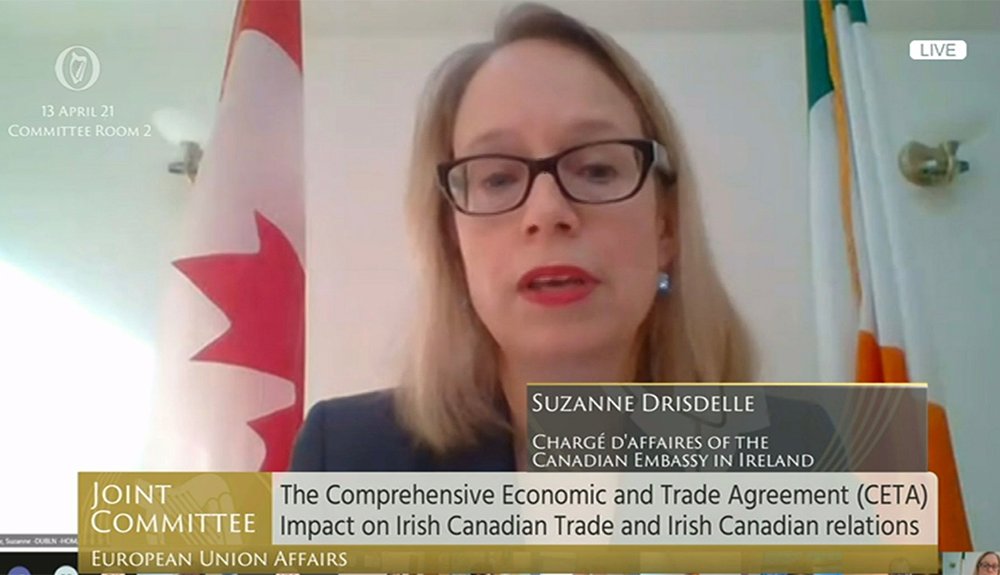BLOG: CETA is working perfectly — for European farmers

Earlier this year, a representative of the Canadian government shared a positive message with farmers in Ireland.
Suzanne Drisdelle, chargé d’affaires at the embassy, spoke about the value of the Canada-European Union trade agreement when she addressed an Irish government committee in April.
She told the committee that the Comprehensive Economic and Trade Agreement is working wonderfully for Irish farmers.
“Certain sectors of the Irish economy have seen a significant growth in exports to Canada since 2016, including dairy, baked goods, textiles, beverages, Irish whiskey and spirits. During this timeframe, Irish beef exports to Canada increased by 700 per cent and cheese exports by over 400 per cent,” Drisdelle said, as reported by the Irish Times.
Drisdelle’s enthusiastic comments about CETA weren’t a shock, because millions of Europeans remain skeptical about free trade and the agreement with Canada. Therefore, embassy staff in Europe continue to promote the deal.
But it is surprising that someone in the federal government would tout the agreement and how terrific it’s been for European livestock producers.
Because CETA was supposed to do the opposite.
“When completely implemented, CETA is expected to result in $1.5 billion in new agri-food exports, including $600 million in beef, $400 million in pork,” the Canadian Agri-Food Trade Alliance said after the deal entered provisional status in September 2017.
Three years and nine months later, most cattle producers in Canada now believe the hype around CETA was overblown.
And many are angry about the deal.
“We get … a lot of crap over the CETA agreement … from producers that are saying, I’ll put it bluntly, what the hell did you sign an agreement like that for?” said Bob Lowe, Canadian Cattlemen’s Association president.
Cattle producers are frustrated because free trade deals are designed to increase trade flows in both directions. For trade in beef, the flow of trade has been a river of European ground beef to Canada and a trickle of prime rib entering Europe.
• In 2020, Europe exported $129 million worth of beef to Canada, up from $14.7 million in 2017. That’s an increase of 878 percent.
• Canada’s beef exports to Europe have climbed from $7.9 million in 2017 to $32.7 in 2020.
On the surface, CETA seems to be working for Canadian ranchers, but most of Canada’s gains have come from better access to the United Kingdom. Beef export value to the U.K. went from zero in 2017 to $18 million last year.
When the U.K. is removed from the equation, the data are ugly from a Canadian beef perspective.
Farmers in Ireland, Germany, Denmark, Italy and Spain are exporting tens of millions worth of beef to Canada.
Canadian cattlemen aren’t doing as well.
Beef exports to France, Germany and Spain — which have a combined population of about 200 million — were $720,000 in 2020.
Beef sales to EU countries are minimal because Europe has maintained barriers to trade, such as requiring Canadian farms and feedlots to be certified — in order to produce beef for Europe. Japan, China, the U.S. and other major buyers of Canadian beef have no such requirements.
They recognize that Canada has a strong regulatory system and that Canadian beef is safe and of the highest quality.
For Canadian cattle producers, the European barriers are annoying. But the massive amount of European beef entering Canada pushes the annoyance to another level.
“That’s $100 million that could be going into Canada’s economy. Instead, it’s going out of Canada’s economy,” Lowe said, referring to the nearly $100 million deficit in beef trade with Europe.
Imports from Europe are hurting the 70,000 cattle producers in Canada and the thousands of people who work in the country’s $18 billion beef sector, but most Canadians have heard nothing about that reality.
The Canadian Embassy Chargée d’affaires @SuzDrisdelle was pleased to be invited to today’s Oireachtas Committee on EU Affairs discussion on #CETA and thanks the Chair, Committee members, Reuben East, @ccollenette for the discussion and interest in this progressive trade agreement pic.twitter.com/K3MHCWejqi
— Canada in Ireland (@canadaireland) April 13, 2021
That’s because federal politicians have been reluctant to say anything critical about CETA.
Mary Ng, the minister responsible for international trade, has only said that CETA is not perfect.
“CETA has delivered on increasing trade with the EU, and our focus is now on eliminating unnecessary barriers to trade to ensure that the benefits of open, inclusive and rules-based trade can be shared more broadly in our societies,” Ng said in March.
The “unnecessary barriers to trade” comment may be helpful, but it contains no specifics, no data and it doesn’t mention that many Canadian cattle producers think that Europe is acting unfairly.
If Minister Ng or any federal minister wants to stand up for Canadian ranchers, they should include a comment from a beef producer in a public statement, perhaps a leader in the cattle industry, who is concerned about the imbalance in trade between Canada and European countries.
“Imports from Ireland were 3,182 tonnes in 2020… up 580 percent from 2016,” Lowe said. “And we didn’t export one single pound of beef to Ireland in 2020.”
If that approach is too honest, or contains too many facts, maybe the federal government and its representatives in Europe should stick with their ongoing communications strategy.
They can continue to tell Europeans that CETA is a fantastic deal for European farmers.
That strategy seems to be working — for European farmers.
Contact robert.arnason@producer.com
Source: producer.com

